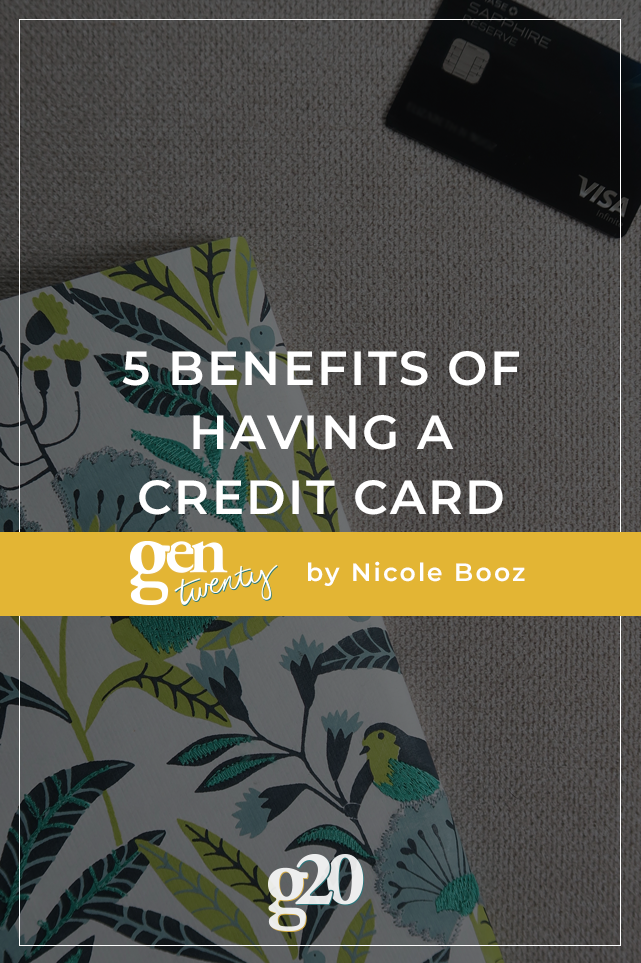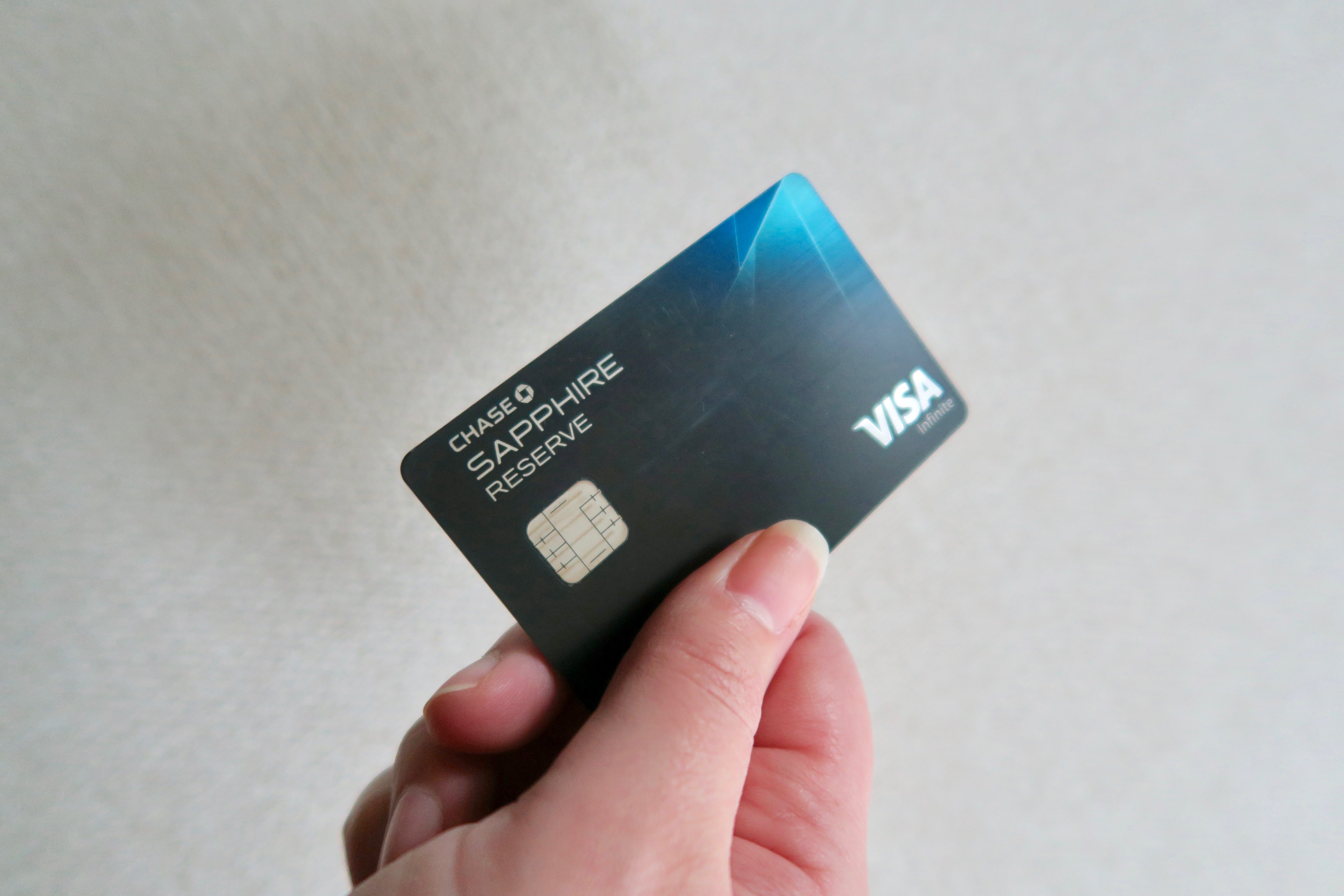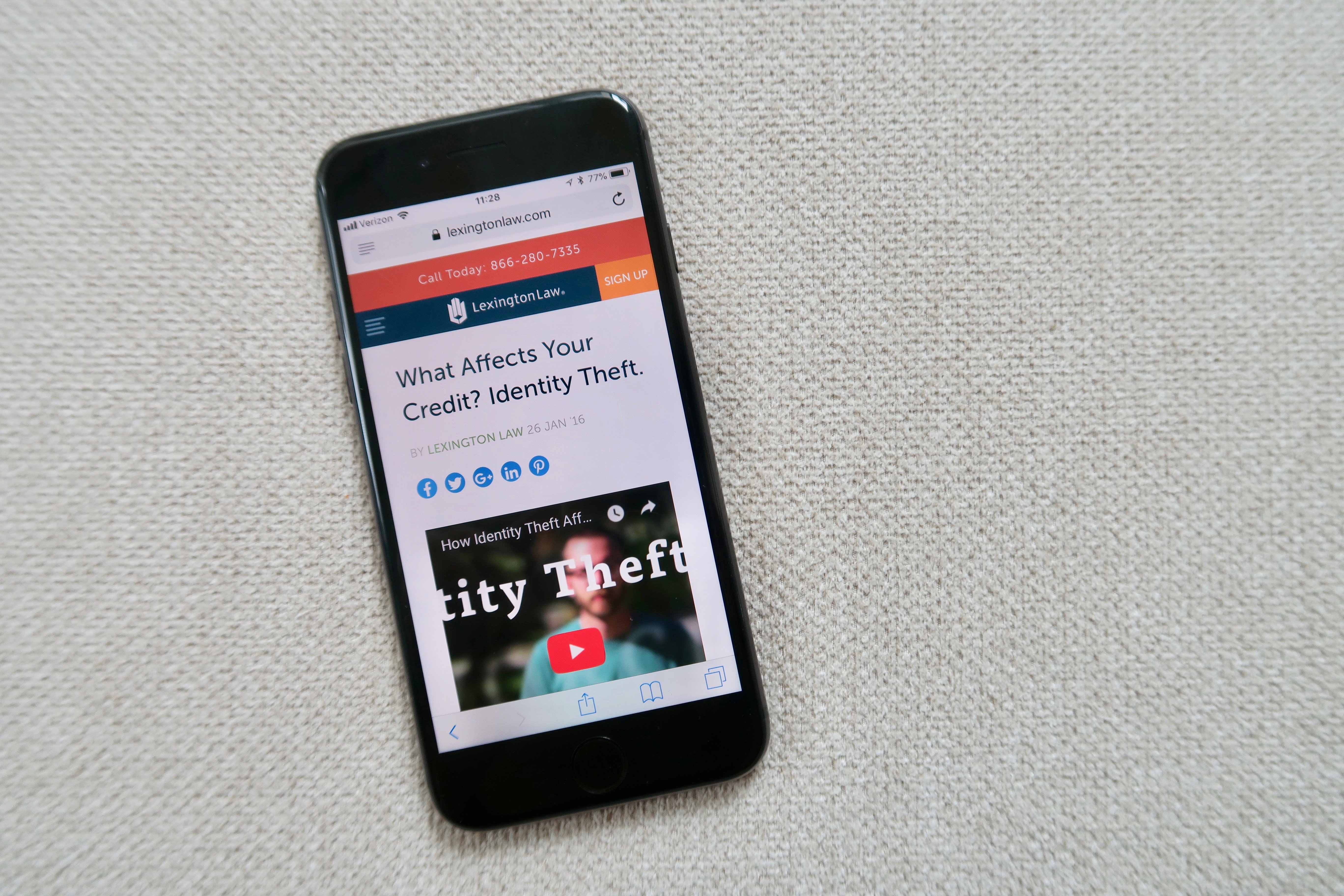This post is sponsored by Lexington Law.

Have you ever heard from someone to be wary of having a credit card? All too often credit cards are seen in a negative light, but why? The truth is that there are so many real, tangible benefits of having a credit card.
My first ever line of credit was a student loan. But as I learned more financially in my college years, I opened a store credit card with a low limit my junior year to start building my credit. Since then, I’ve learned a lot about using a credit card as a tool and part of my overall financial strategy.
5 Benefits of Having a Credit Card
1. Building credit.
First and foremost, a primary benefit of having a credit card is to build credit! Your FICO credit score puts you on scale ranging from 300-850 and tells lenders how responsible you are. A lower score indicates they’ll be taking on a bigger risk (and therefore making more money back on interest). Whereas a higher score shows that you a reliable borrower and qualify for much lower interest rates. Your credit report is a record of your credit history and is how your score is calculated. Lenders will typically pull your credit report to get a more accurate view of who they’re lending to.
If you don’t already have a credit card, I recommend going for one with no fee. It’s likely that since this is your first credit card, it will have a lower limit — which is great for learning the basics of financial responsibility.
Building credit is an essential part of your financial life. It’s what landlords use to determine if you can rent a place; and it’s used for determining interest rates when you finance a vehicle or take out a mortgage; it can even be used by employers to determine how responsible you are and your character. Basically, it matters, and the higher your score the better. Plus, the sooner you start building it, the longer your credit history will be. And there’s benefits for that too.
2. Earning points and rewards.
By now you’ve probably heard of traveling hacking. AKA how credit card holders earn and redeem points for super cheap travel. Many travel hackers even use their points to stay in luxury hotels around the world and fly first class!
The type of rewards cards you will look for depend on your lifestyle and goals for your points. Some cards will give you cash back while others will let you redeem points only for hotel rooms. There are so many to choose from, so make sure to be selective about which cards you choose to apply for.
Many cards with great rewards system often come with fees. Many times they are worth it, like in Michelle’s case. But other times, not so much if you aren’t going to get value out of your card.
If you’re using a credit card anyway, you might as well get a little something extra out of it, right? Make sure to do your research on how to choose the right credit card before you start filling applications out like crazy.
[click_to_tweet tweet=”How to know which credit card rewards system is right for you:” quote=”How to know which credit card rewards system is right for you:”]

3. Improving your credit.
If you already have decent credit but are looking to improve it or even get your score into the excellent range, credit cards are a great tool to do so.
You might be surprised to find out that there are five factors that go into calculating your credit score:
- Payment history — 35%
- Utilization ratio — 30%
- Length of credit history — 15%
- New credit or inquiries (this hurts!) — 10%
- Types of credit/Credit Mix — 10%
If you already have a low credit score, using credit cards can also be a strategy for increasing that score. There are a variety of factors that go into this, though. For example, your utilization ratio makes a difference as well as your payment history.
With a credit card, making your payments on time, using less than 30% of your available credit, having a long history, and diversifying your types of credit with a credit card can help you improve your score! Little by little as you spend on your credit card and pay it in full each month, your credit score will likely begin increasing. If you know you’ll struggle with this, keep your credit card for one expense only, like gas or groceries. Then there is a much lower risk that you’ll go overboard.
However, in many cases, there is more to it than that. Credit repair can often be a complicated process which is why it’s important to have an advocate with intimate knowledge of your credit rights and your unique situation. Anything from divorce, to identity theft, medical expenses, student loan debt, and even military service can affect your credit negatively. For inaccurate items and to seek guidance, contact the professionals at Lexington Law for more information.
[click_to_tweet tweet=”5 Benefits of Having a Credit Card” quote=”5 Benefits of Having a Credit Card”]
4. Identity theft protection and purchase protection.
Did you know that most credit cards offer far more protection for you as a consumer than debit cards do? If you’re using your debit card online, you’re leaving yourself vulnerable to having your information stolen. As helpful as technology can be, there are people who will use it for nefarious purposes, as evidenced by data breaches.
If you use a debit card online, you’re using a direct link to your bank account. A thief could easily clean out your account and you would be none the wiser until you checked it. Plus, even if you are able to prove fraudulent charges, your refund could takes days or weeks to get back to you.
And as our friends at Lexington Law point out, your loss coverage is questionable:
Recouping lost debit funds isn’t a guarantee. According to the Electronic Fund Transfer Act (EFTA), a consumer’s liability for fraud is based on timely reporting. You could owe up to $50 if the theft is reported to lender within two business days, or up to $500 if reported within three to 60 days. After that, the law allows “unlimited liability for unauthorized transfers occurring 60 calendar days after the periodic statement and before notice to the financial institution.” Translation: If your debit account is accessed without your knowledge, you could be stuck with the bill.
Using a credit card is more beneficial because “while you may be held responsible for fraudulent debit charges, the Fair Credit Billing Act (FCBA) limits your liability to $50 for fraudulent credit use.” Limiting your use of a debit card, even in person keeps your cash safer.
If you do find yourself to be a victim of identity theft, there are resources available for you! Contact the credit repair professionals at Lexington Law for a consultation to begin your journey to recovery.
[click_to_tweet tweet=”Why to use a credit card – instead of a debit card – online:” quote=”Why to use a credit card – instead of a debit card – online:”]

5. Learning financial responsibility.
Credit cards are not free money. And the earlier you learn that lesson, the better! It almost seems like we are being set up for financial failure. Did you know only four out of 50 states require a class in financial education? What’s more, 65% of student loan borrowers misunderstood or were surprised by aspects of their loans or the process as a whole. What this shows is a lack of financial education and responsibility. Which means, now more than ever, that we have to pursue our own financial educations.
Because a credit card is a tool to help build and improve your credit, it’s important that you learn to use it responsibly as early as possible. You’ll learn to make your payments on time (and the subsequent consequences if you do not). Plus, you’ll learn how to spend within a limit. You’ll gain a better understanding that credit is not free money and about compound interest if you leave a balance with a high interest fee.
And most importantly, you’ll learn that you and you alone are responsible for your finances. It’s up to you to make the best decisions possible for your financial future. Seek help when you need it and hold yourself accountable for your financial decisions.
[click_to_tweet tweet=”Did you know only four out of 50 states require a class in financial education? ” quote=”Did you know only four out of 50 states require a class in financial education? “]
Credit cards are tools that should be used wisely and to your advantage! Be a smart consumer and smart spend when it comes to maintaining your credit. Did any of these benefits surprise you? I’d love to know in the comments!
